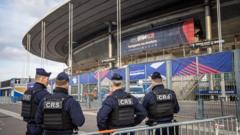In response to escalating geopolitical tensions and recent violence in Amsterdam, Paris police are gearing up for a highly secured football match between France and Israel. With 4,000 officers patrolling the venue and public transport, the authorities aim to ensure a safe environment for one of Europe’s most watched international fixtures set to occur on Thursday.
Laurent Nuñez, Paris police chief, announced the extensive security measures being implemented, including 2,500 officers stationed at the Stade de France, along with 1,600 private security personnel and an elite anti-terrorist unit assigned to protect the Israeli team. This heightened level of vigilance reflects the authorities’ commitment to maintaining public order during what has been categorized as a high-risk match following disturbing incidents that occurred during last week’s Ajax vs. Maccabi Tel Aviv match.
The match is drawing attention not only for sporting reasons but also due to the rising concerns over antisemitism and public safety in Europe following a week of violence where Maccabi fans faced aggression on the streets of Amsterdam. Consequently, as a precaution, the Israeli government has advised that no more than 100 loyal fans will be making the trip, significantly limiting attendance from Israel.
Politicians have condemned the resurfacing of antisemitic behaviors, prompting French President Emmanuel Macron to announce his attendance at the event in a show of solidarity with the Jewish community across Europe. The stadium, which normally seats 80,000, will only see a fraction of its capacity filled as supporters brace for extensive identity checks and stringent security protocols.
Further complicating the atmosphere, protests orchestrated by pro-Palestinian and anti-racist groups are planned to coincide with the match, resulting in clashes with the police, highlighting the tense socio-political backdrop. The stakes are high as relations between France and Israel fluctuate, with Macron’s recent comments perceived as critical of Israeli government actions leading to greater scrutiny and heightened awareness from both national sides.
While Interior Minister Bruno Retailleau emphasized that cancellation or relocation of the match is not an option, calls from opposition parties to reconsider the match, amid accusations of honoring a nation they believe is committing atrocities, continue to surface. As the match approaches, the complex dynamics of international politics, national safety, and sporting identity remain in sharp focus in Paris.














